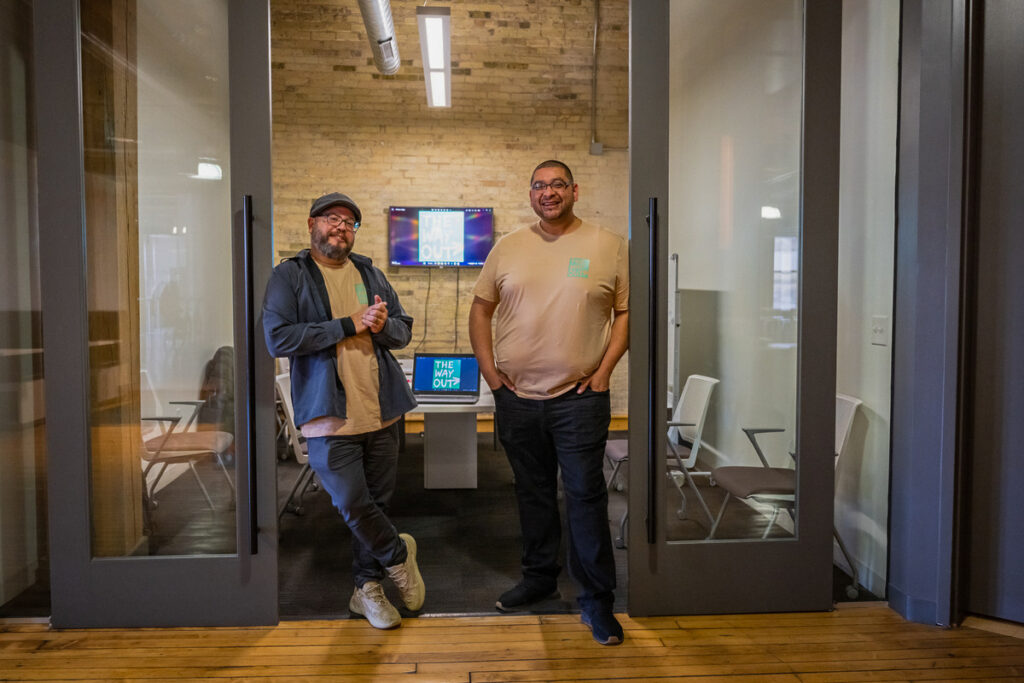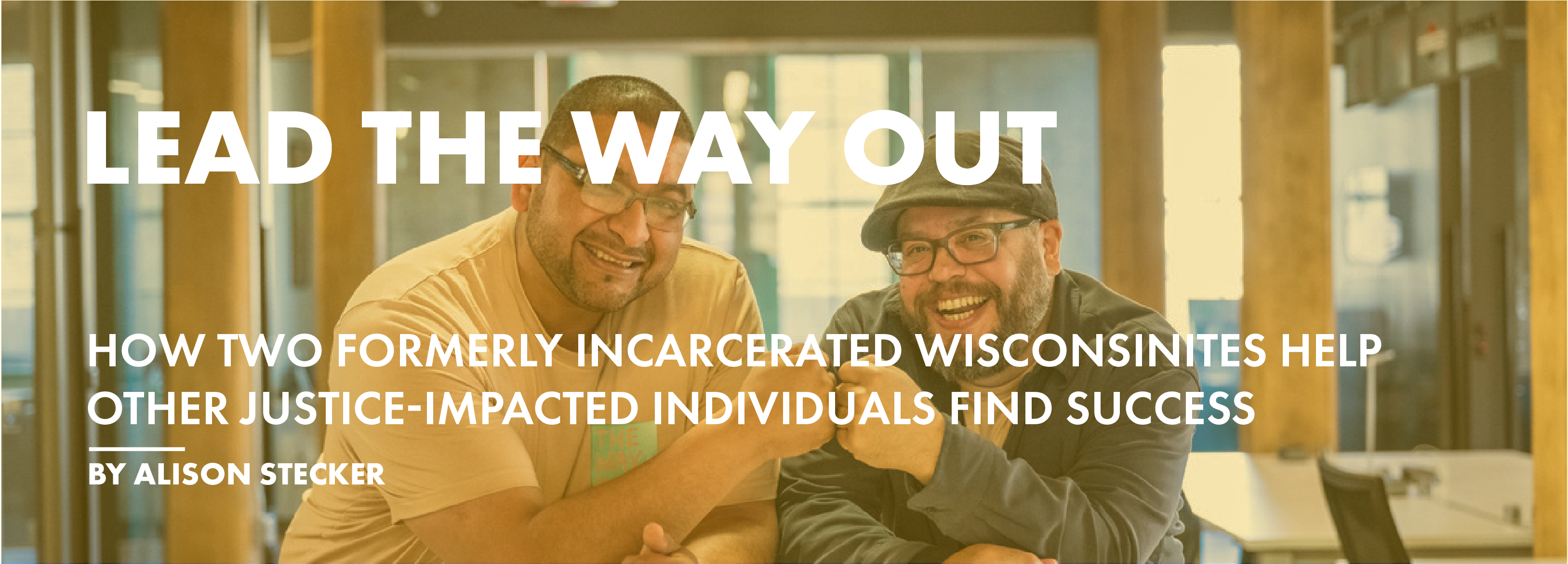The aroma of freshly brewed coffee mingled with the scent of possibility within the quiet walls of Toast, a breakfast joint nestled in the Walker’s Point neighborhood in Milwaukee.
The restaurant was closed to everyone but two Latino men. Both had been in prison. Both wanted to help justice-impacted individuals, or folks who’ve been directly or indirectly impacted by the legal system.
As their coffee cups ran low and conversation flowed, they each tossed $5 on the table, planting the beginnings of what would evolve into a fair chance employment platform called The Way Out.
“Mistakes don’t define who we are but what we do afterward,” says Ruben Gaona, co-founder of The Way Out.

Gaona and co-founder Eli Rivera both understand the realities of reentry and that successful reintegration begins with securing employment.
“It’s often hard for individuals who have criminal records to find employment because of the biases against justice-involved individuals,” Gaona says. “When getting assistance to find employment, they are often forgotten once they are employed, and we don’t know what happens on that 91st or 100th day.”
Wisconsin has one of the highest incarceration rates in the U.S., locking up a large percentage of its population. Advocates for justice-impacted individuals are working to provide more resources for people coming out of prison. The Way Out is one support system helping to bridge the gap between prison release and successful reentry.
As of September 2023, there were 21,683 incarcerated people in Wisconsin, with 21.8% having less than one year left to serve before release. The risk of reoffending increases if they don’t have access to employment resources to support their reintegration into life beyond prison, according to Tawandra Rowell-Cunsolo, assistant professor in the Sandra Rosenbaum School of Social Work at UW–Madison.
“My research was showing or suggesting that people who were engaged in that system remained engaged with it throughout the life course,” Rowell-Cunsolo says. “It’s not like you’re in jail for a month and then you come out. A lot of them are going back in.”
Rowell-Cunsolo says employment is important for successful reentry as it facilitates access to health care and housing. However, previously incarcerated individuals are unemployed at a rate exceeding 27% — surpassing even the Great Depression.
“It’s really difficult for them to have steady footing,” Rowell-Cunsolo says. “If they don’t have an income coming in…they are unable to support themselves.”
But that is where people like Rivera and Gaona come in.
The Way Out connects justice-impacted job seekers with support and suitable employers to facilitate a successful transition from reentry to society, aiming to end the incarceration cycle through technology and fair wages, according to its website.
“You can’t just give somebody a job and expect everything to be OK after incarceration,” Rivera says. “The intention is not only to introduce them to a job and hopefully a career, it’s all about retention. We want to make sure that through this continuum of services, employment is continuous so there isn’t a disruption in the life of a justice-impacted employee.”
Life behind bars
Rivera, a first-generation Puerto Rican, was born and raised in a predominantly Black neighborhood in Milwaukee. He got involved with marijuana manufacturing which landed him in federal prison in his late 20s.
After serving two years, Rivera transitioned to a halfway house. He says the facility’s administration told individuals if they couldn’t find work within two weeks, they had to return to prison.
Although Rivera found a job, not everyone was as lucky as him. He reflects on his time in the halfway house, remembering the crying of grown men who couldn’t secure employment.
“The frustration and the direness of those situations, especially when people were actually getting revoked and being told, ‘Well, you’re going back tomorrow,’ … It always stuck with me,” he says.
This prompted Rivera, now 51, to rethink his job in hospitality and shift to give back to folks with similar life experiences, leading him to Gaona.
Gaona was born in El Paso, Texas, but considers Milwaukee home. He moved to the city’s south side when he was 15 years old and started selling drugs by the age of 17. At 19, he joined the Navy to support and provide a “better lifestyle” for his daughter but was honorably discharged six and a half years in — unable to re-enlist due to medical reasons.
At that point, Gaona had five kids to support. He quickly went into survival mode and found himself back selling drugs.
“In the blink of an eye, my whole life changed,” he says, reflecting back.
In March 2010, Gaona was arrested and sentenced to a decade in federal prison. Five years in, a man asked him, “What do you have to show for?”
And that question changed his journey.
“I went back to my cubicle, and for the first time, I cried for being arrested,” Gaona says. “I [told myself] I would no longer allow people to dictate which direction I go. I’m going to take control of my own life.”
Gaona, 42, was released in 2017 and aspired to become a case manager for other incarcerated people, but he was told by probation and parole that he had to settle for a bare minimum-paying job.
“Finding employment upon being released was hard for me,” he says.
Gaona worked as a talent development specialist for the FoodShare Employment Training program before transitioning to work for the Wisconsin Department of Workforce Development as a bilingual employment training specialist and assisted in running its reentry program. Within two years of working with justice-involved individuals, Gaona realized how difficult the job search was.
“How can we say people are provided a true second chance if justice-involved individuals are struggling to get a job or are being told to settle for a bare minimum paying job at $7.25? You can’t live off of $7.25, and the cost of living is so high,” he says. “It’s like the system is set up for people to be released and then being told to go get any job even if it is a bare minimum job at $7.25 where eventually, with that amount of pay, you can’t sustain yourself or your family, and you end up going into a survival mode that lands you back into prison.”
Finding “The Way Out”
The Way Out is an anti-bias employment software platform for justice-impacted job seekers. It focuses on three components of the job hunt: the justice-impacted job seeker, the employer and the supportive service providers.
According to Rivera, the platform generates an anonymous profile that eliminates personal identifiers that could lead to biases among potential employers. The system displays the job seeker’s strengths, employment history, certifications and credentials earned both in and out of incarceration. Employers who use the platform need to commit to hiring at least 10 justice-impacted job seekers, Rivera says.
The platform also aggregates the supportive services needs of the job seeker and matches them with a primary supportive service provider, who assists them in accessing the appropriate resources. The Way Out currently offers around 30 support services, including their nonprofit called My Way Out, which has served 262 clients as of 2022.
“One of the beauties of our nonprofit is the fact there is no limitation when we stop working with you,” Gaona says. “We’re always going to be there.”
Thomas Chadwick is a testament to just that.
He first learned about My Way Out through an email program while incarcerated in a state prison. After his release in January 2023, he contacted Gaona, who immediately provided support.
“So many programs say they got you, and in my eyes, everything has always been broken,” Chadwick says. “[Ruben] dropped whatever he was doing and came and got me… He didn’t give me the path, but he’s like here I’ll break these barriers so you can be successful.”
Chadwick dreamed of becoming a barber, so Gaona connected him with a shop owner in Milwaukee. He worked there for two months before saving enough money to start his shop in Hartford, Swagies Barbershop, which opened in April 2023.
“Without [Ruben], I don’t think I would have made it this far this fast. Or maybe I would’ve failed because I didn’t feel I had any support,” Chadwick says. “It means more than I can even give you a word. So forever grateful.”
